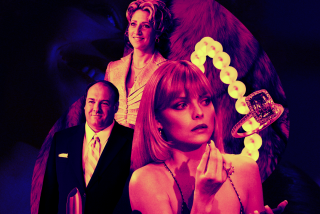Politically incorrect fashion term
When a word or phrase that’s been floating around in the culture finally lands in the Oxford English Dictionary, it has transcended the zeitgeist. Homer Simpson’s exasperated “d’oh” made the cut last year. So did “retail therapy” and “boy band.”
According to Jesse Sheidlower, North American editor of the dictionary, an unusual definition of the phrase “wife beater” is now a contender for lexicographic immortality.
The phrase no longer would strictly refer to a man who beats his wife; its definition would be expanded to mean a white ribbed-cotton sleeveless undershirt that is a wardrobe basic these days for movie costumers, rap stars and models.
In the popular imagination, the shirts are associated with the Stanley Kowalskis and Tony Sopranos of the world: anti-elitist, testosterone-dripping lugs who sit in front of the tube in their underwear and slap their wives around, hence (presumably) the slangy-sounding name.
Although the style has been around for more than a century, in recent years there’s been a boom. The shirts have shown up on bad boys Tommy Lee, Kid Rock and Snoop Dogg and on femme fashion plates Madonna, Britney Spears and Gwyneth Paltrow. Calvin Klein makes them. Even Chanel and Dolce & Gabbana have offered versions of the scoop-neck tops.
The desire to look trashy isn’t hard to explain (they’re sexy on the right body and showcase well-toned biceps). What’s mysterious is how such a potentially offensive phrase managed to slip into the fashion lexicon so easily.
Mark-Evan Blackman, chairman of the menswear design department at New York’s Fashion Institute of Technology, remembers hearing “wife beater” used when he was growing up in Brooklyn in the 1970s. It referred to the shirts worn by “pumped-up Italian guys in pizzerias,” said Blackman. “The stoves were 150 degrees, these guys were lifting weights and they had a virile appeal.”
“It’s a reference to class,” said Valerie Steele, curator of the museum at the Fashion Institute of Technology, who had not heard the term “wife beater” until a few years ago. “The subtext is that Stanley Kowalski and other working-class men are more sexy and physical, which may be why everyone wears them at the gym.”
The undershirts are often referred to in music and film. Rapper Eve sings about how good she looks in her “wife beater with a bangin’ tan.” And in the final scene of “8 Mile,” Eminem mocks rival rapper Papa Doc for wearing one of the shirts, calling him “Snoop Dogg in a bra.”
“Everyone wears them, especially hip-hop artists,” said Susan Bauer, director of fashion programming at MTV. “But I was told by an executive not to use the word in the workplace,” she said. “So we just take off the ‘wife’ and call them ‘beaters.’ ”
The term may have resurfaced as part of an urban aesthetic that has swept popular culture in the last 15 years, suggests Blackman. “At one time, people aspired to be wealthy and to get out of the city. But now people feel to be cool you have to be down with it. I have wealthy students who say such and such is ‘ghetto’ or ‘pimp,’ and I’ve heard ‘wife beater’ at Princeton and Brown. For the people using these terms, they’re not socioeconomic, they’re descriptive. Because regardless of whether you are black or white, live in the city or the suburbs, everyone today grows up listening to rap.”
Part of the appeal of the term “wife beater” may be its sheer political incorrectness. James Doolin of Dallas found himself in the middle of a media firestorm after launching a Web site that sells the shirts, embroidered with script that spells out “wife beater.”
Launched in 2000, the site (www.wife-beaters.com) features a “Wife Beater Hall of Fame,” with photos of Ike Turner, John Wayne Bobbitt, Mike Tyson and others, and it offers a discount to customers who can prove a domestic violence conviction. The discount, says Doolin, is a joke, but he defends his business concept, saying that the term “wife beater” has transcended its literal meaning to become a symbol for all rebellious, antisocial behavior. “It goes with the MTV ‘Jackass’ mentality,” he said. “It’s about a juvenile sense of humor that appeals to people in their teens and 20s.”
But not everybody is laughing. Karin Willison, a 25-year-old graduate student studying psychology at Antioch University in L.A., launched a counter Web site (www.outspokenclothing.com) that sells T-shirts emblazoned with the slogan “wife beater beater” and an illustration of a woman punching a man. “It’s intended to be humorous,” she said. “I don’t advocate violence either way, but if people are buying shirts that say ‘wife beater,’ women are going to fight back.”
Kim Gandy, president of the National Organization for Women, says that calling a shirt a “wife beater” trivializes domestic violence.
“The implication is that wife beating is not viewed as sufficiently serious to lift it above the level of something that’s OK to joke about.”
Warren Farrell, the San Diego-based men’s advocate and author of “Women Can’t Hear What Men Don’t Say,” finds the term offensive to men as well as women. “We are so conscious of things like wife beating, but we are not conscious at all about husband beating. Domestic violence is equal opportunity. I wouldn’t feel good about people wearing ‘husband beaters’ either.”
The OED’s Sheidlower, who says “wife beater” probably will turn up soon in the dictionary’s online edition (www.oed.com), says any fuss over the phrase is media-made. “Apart from fashion writers writing about this, there’s no evidence that this term is being used in an offensive way.... People who use this word are not using it to put anyone down.”







